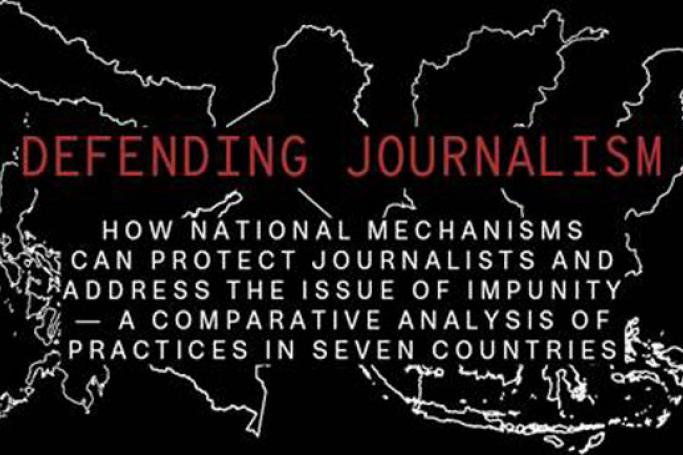‘Defending Journalism’, a new global study by International Media Support (IMS) analyses the efforts to safeguard journalists in seven countries where environments of conflict and instability challenge the ability of journalists to produce good, in-depth journalism. The study will be launched at this year’s Media Development Conference currently taking place in Yangon in Yangon.
2017 has been a troubling year for Myanmar journalists. Journalists have been charged under various laws - often for criticizing the military or government. The Rakhine conflict has highlighted the need for and lack of true and verified information. Access to information and safety of journalists are two sides of the same coin, and will be some of the issues discussed at this year’s Media Development Conference, where one session will be devoted to the issue of impunity and safety of journalists:
“The safety of journalists and access to information are essential ingredients in being able to practice professional and ethical journalism without fear of retribution. Issues of impunity remains prevalent across the sector and with the country’s transition to democracy we need high, ethical journalism to report accurately on the difficult topics related to peace and conflict,” says Myo Min Htike, Programme Manager, International Media Support.
IMS’ study ‘Defending Journalism’ aims to provide a mapping and greater understanding of what works – and what does not work when it comes to addressing the safety of journalists. These experiences can be useful when planning safety intervention in Myanmar:
“The study shows that the most effective responses to the safety of journalists are those born and led by a broad coalition of stakeholders that includes media, civil society, authorities where possible and international organisations. The Media Development Conference is therefore a good place to discuss solutions to journalist’s safety in Myanmar and get broad commitment to this issue,” says Ranga Kalansooriya, Advisor at International Media Support, and continues:
“The ability of journalists to safely carry out their role as society’s watchdog is an issue that concerns us
all.”
The seven countries in focus – the Philippines, Indonesia, Pakistan, Iraq, Nepal, Colombia and Afghanistan – were selected for analysis because they showcase a varied range of responses to improving the safety of journalists.
In Bagdad, Iraq, media and security forces have signed an agreement “regulating” their relationship following dialogue meetings. In the Philippines, press freedom advocates have teamed up with Catholic Church to shelter journalists under threat. In Pakistan, six press clubs across the country work together to provide safety hubs for journalists in need of help.
Afghanistan and Colombia have succeeded in establishing broad, locally anchored coalitions of government authorities, media and civil society organisations around so-called national “safety mechanisms”, a series of interlinked activities that together address the safety of journalists.
These mechanisms aim to provide journalists in distress with a “package” of assistance depending on their immediate needs such as emergency support including relocation, safe houses, legal advice, safety training workshops, conflict sensitive journalism training and advocacy campaigns against press freedom violations and for improved legislation.
One of the weaknesses of these country-wide mechanisms, as also pointed out in the study, is the fact that the mechanisms are largely dependent on foreign funding to function. Also, a lack of coordination and agreed joint priorities amongst international media development organisations and amongst local media development actors in some of the countries surveyed, has in some instances weakened the overall impact of the efforts made to improve safety.
The publication ‘Defending journalism: how national mechanisms can protect journalists and address the issue of impunity – a comparative analysis of practices in seven countries’ is part of a larger project on the safety of journalists financed by the Danish Ministry of Foreign Affairs which includes a peer-to-peer sharing of best practices on safety across borders co-implemented by the International Federation of Journalisms (IFJ).
‘Defending Journalism’ launched at Yangon Media Development Conference
07 December 2017
‘Defending Journalism’ launched at Yangon Media Development Conference












